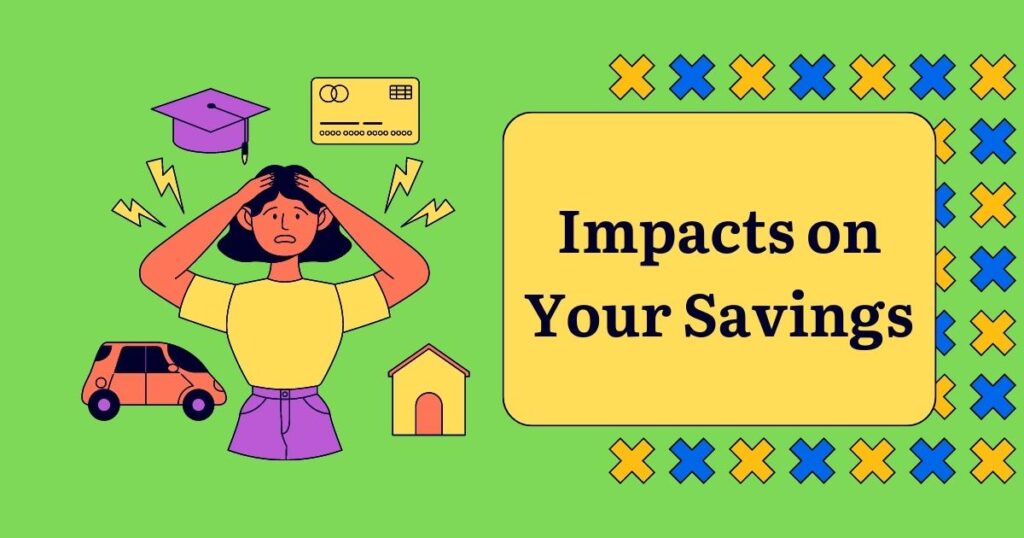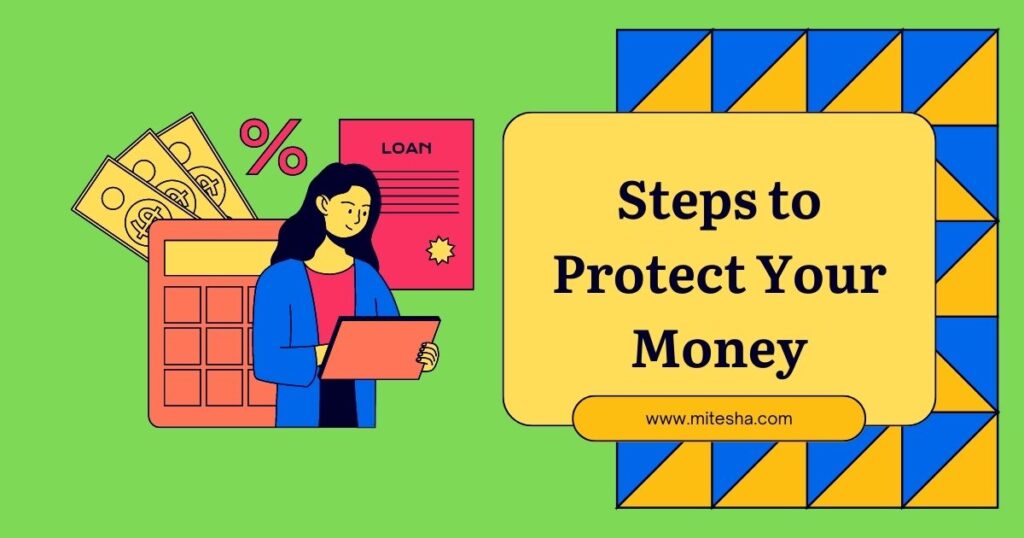Introduction:
An economic downturn can have significant implications for your savings. Whether it’s a recession, financial crisis, or market downturn, understanding how these events can impact your savings is crucial for effective financial planning. In this article, we will explore the ways in which an economic downturn can affect your savings and provide insights on how to navigate through challenging times.

Impacts on Your Savings
Decreased Interest Rates
During an economic downturn, central banks often implement monetary policies to stimulate the economy. One common measure is reducing interest rates. While lower interest rates can make borrowing more affordable, it also means that the returns on savings accounts, certificates of deposit (CDs), and other fixed-income investments decrease. As a result, your savings may generate less interest income, affecting your overall earnings.
Market Volatility and Investment Losses
Economic downturns are often accompanied by increased market volatility. Stock markets can experience sharp declines, affecting the value of your investment portfolio. If you have invested a portion of your savings in stocks, mutual funds, or other equity-based investments, you may experience temporary losses during market downturns. It is important to remember that market fluctuations are normal, and it’s advisable to adopt a long-term perspective and not make impulsive decisions based on short-term market movements.
Job Loss and Income Reduction
Economic downturns can lead to job losses and income reduction for individuals and businesses. If you experience job loss or a decrease in income, it can become challenging to maintain your savings goals or contribute to your savings accounts. During such times, it’s essential to reassess your budget, prioritize essential expenses, and explore alternative income sources to ensure you continue to save as much as possible.

Inflation and Purchasing Power
While an economic downturn may cause decreased interest rates, it can also lead to inflationary pressures. Inflation refers to the general increase in prices over time, reducing the purchasing power of your savings. If the rate of inflation exceeds the interest earned on your savings, the real value of your money can erode. To combat inflation, consider investing in assets that have historically outpaced inflation, such as stocks, real estate, or inflation-protected securities.
Increased Financial Stress
Economic downturns can bring about financial stress and uncertainty, which can impact your savings behavior. During times of economic hardship, individuals may be tempted to dip into their savings to cover daily expenses or unexpected emergencies. While it may be necessary in some cases, it’s important to carefully evaluate the long-term consequences and explore other alternatives, such as reducing non-essential spending or seeking additional sources of income, before depleting your savings.
Opportunities for Strategic Investments
Despite the challenges, economic downturns can also present opportunities for strategic investments. Asset prices may become more attractive, and investing in undervalued assets can yield significant returns over the long term. However, it’s important to conduct thorough research, diversify your investments, and consult with a financial advisor to ensure that any investment decisions align with your risk tolerance and long-term financial goals.
Steps to Protect Your Money
In times of economic downturn, it’s crucial to safeguard your finances and make smart decisions to protect your hard-earned money. Whether it’s a recession or a financial crisis, taking proactive steps can help mitigate the impact and ensure your financial stability.

Diversify Your Investments
One key principle to protect your money during an economic downturn is diversification. Spreading your investments across various asset classes can help reduce risk. For instance, consider allocating your portfolio between stocks, bonds, real estate, and commodities. By diversifying, you reduce the likelihood of suffering significant losses if one sector or asset class experiences a downturn.
Focus on Defensive Stocks
During an economic downturn, certain industries tend to outperform others. Defensive stocks, such as those in healthcare, consumer staples, and utilities, often show resilience in turbulent times. These sectors provide essential products and services that people need regardless of economic conditions. Research by the International Monetary Fund (IMF) has shown that defensive stocks tend to exhibit lower volatility during economic crises.
Maintain an Emergency Fund
Building and maintaining an emergency fund is crucial during an economic downturn. Aim to have at least three to six months’ worth of living expenses saved in a separate account. This fund acts as a safety net and provides a buffer against unexpected job loss, medical expenses, or any other financial emergencies. Keep your emergency fund in a highly liquid and low-risk instrument, such as a high-yield savings account or a money market fund.
Minimize Debt
During an economic downturn, the risk of unemployment or reduced income increases. Minimizing debt can help alleviate financial strain during challenging times. Prioritize paying off high-interest debt, such as credit cards or personal loans. Refinancing existing loans to secure lower interest rates may also reduce monthly payments, providing some breathing room in your budget.
Reassess Your Insurance Coverage
Review your insurance policies to ensure you have adequate coverage during an economic downturn. Health insurance, disability insurance, and life insurance are especially important. A comprehensive health insurance policy can protect you from exorbitant medical bills, while disability insurance can provide income replacement if you become unable to work. Life insurance ensures your loved ones are financially secure in the event of your untimely passing.
Increase Your Savings Rate
During times of economic uncertainty, it’s wise to increase your savings rate. Cut back on discretionary spending and identify areas where you can save money. By living below your means, you can build up savings more quickly and create a larger financial cushion. Consider automating regular contributions to your savings or retirement accounts to ensure consistent saving habits.
Stay Informed and Seek Professional Advice
Keeping yourself informed about economic trends and financial markets is crucial during an economic downturn. Stay updated on news and economic indicators to understand the broader economic landscape. It’s also beneficial to seek professional advice from a certified financial planner or investment advisor. They can provide personalized guidance based on your financial goals and risk tolerance.
Protecting your money during an economic downturn requires a combination of proactive strategies and prudent financial management. By diversifying your investments, focusing on defensive stocks, maintaining an emergency fund, minimizing debt, reassessing insurance coverage, increasing your savings rate, and staying informed, you can safeguard your finances in challenging times. Remember that each individual’s financial situation is unique, so it’s important to tailor these strategies to your specific needs and goals.
Frequently Asked Questions (FAQs)
Q1: What is an economic downturn?
An economic downturn refers to a period of negative or sluggish economic growth. It is typically characterized by a decline in economic activity, such as a decrease in gross domestic product (GDP), rising unemployment rates, reduced consumer spending, and a slowdown in business investment. Economic downturns are often associated with recessions or financial crises.
Q2: What causes an economic downturn?
There are various factors that can contribute to an economic downturn. Some common causes include:
- Financial imbalances: Excessive debt levels, asset price bubbles, or a banking crisis can trigger an economic downturn.
- Changes in consumer and investor confidence: A loss of confidence in the economy or financial markets can lead to reduced consumer spending and investment, causing a downturn.
- External shocks: Events such as natural disasters, geopolitical tensions, or global economic instability can disrupt economic growth and lead to a downturn.
- Monetary and fiscal policy decisions: Inappropriate monetary policies, such as excessive tightening, or ineffective fiscal policies can impact economic growth and contribute to a downturn.
Q3: How long does an economic downturn typically last?
The duration of an economic downturn can vary widely depending on its underlying causes and the effectiveness of policy responses. Some downturns may be relatively short-lived, lasting a few quarters, while others can extend over several years. The severity of the downturn and the speed of recovery also play a significant role in determining its duration.
Q4: How does an economic downturn impact employment?
During an economic downturn, businesses may face reduced demand for their products or services, leading to layoffs or hiring freezes. Unemployment rates tend to rise as companies downsize or close, and individuals may find it more challenging to secure new employment opportunities. The duration and severity of the downturn can determine the extent of the impact on employment.
Q5: How can individuals protect their finances during an economic downturn?
To protect finances during an economic downturn, individuals can consider the following strategies:
- Build an emergency fund: Save an adequate amount to cover essential expenses in case of job loss or unexpected financial emergencies.
- Diversify investments: Spread investments across different asset classes to reduce risk and limit exposure to any single sector.
- Minimize debt: Pay off high-interest debt and avoid taking on new debt during a downturn to maintain financial stability.
- Evaluate spending habits: Review and prioritize expenses, cutting back on non-essential items and focusing on needs rather than wants.
- Seek professional advice: Consult with a financial advisor who can provide guidance tailored to individual circumstances and help navigate through challenging times.
Q6: Are there any opportunities during an economic downturn?
While economic downturns can be challenging, they can also present opportunities for strategic investments. Assets may become undervalued, providing potential long-term gains. Additionally, acquiring new skills or pursuing further education during a downturn can enhance employability once the economy recovers.
It’s important to note that investment opportunities during a downturn carry risks, and thorough research and careful consideration are essential before making any investment decisions.
Remember that economic cycles are a natural part of the economic system, and taking proactive steps to protect finances and adapt to changing circumstances can help individuals navigate through an economic downturn more effectively.
